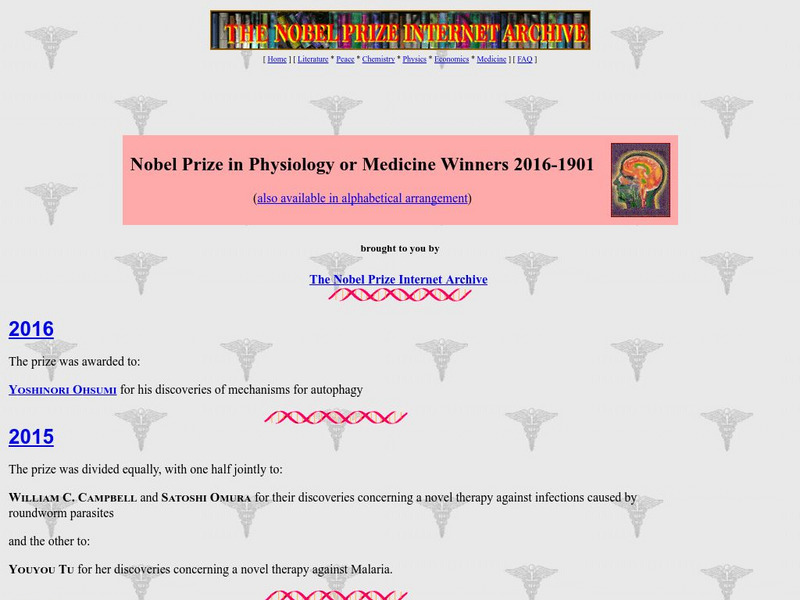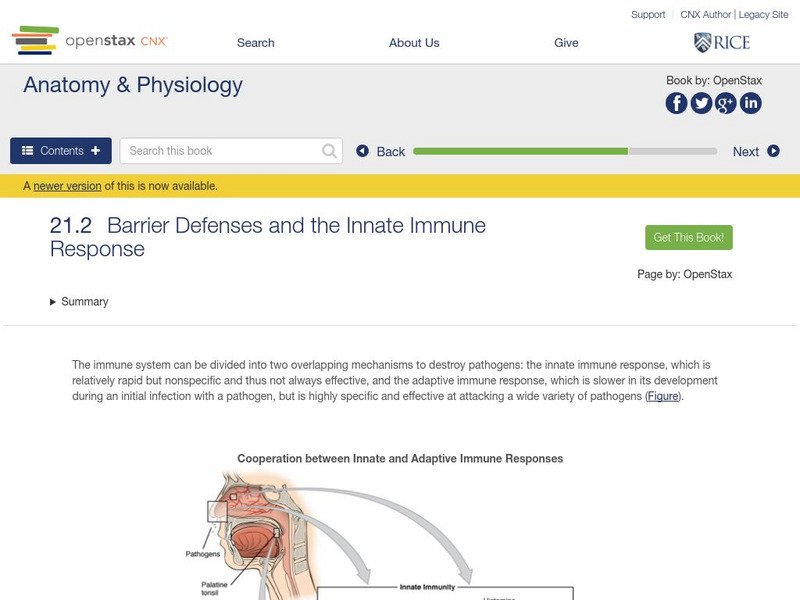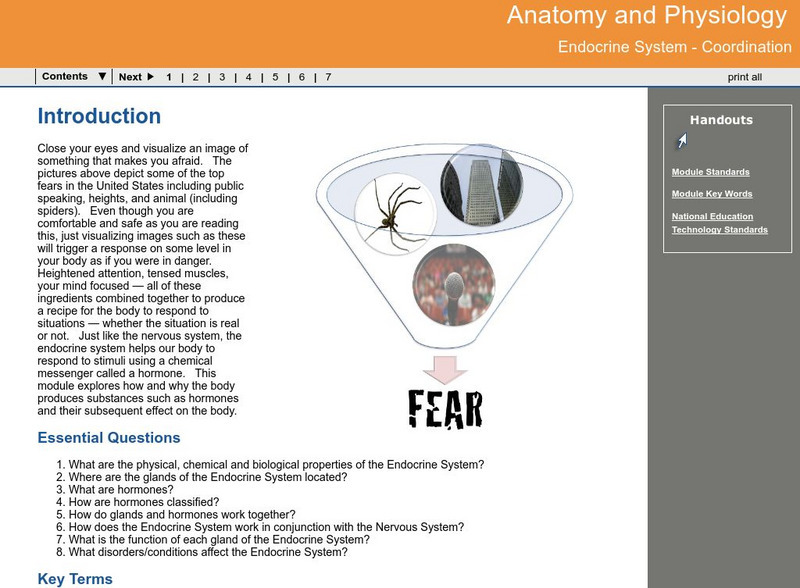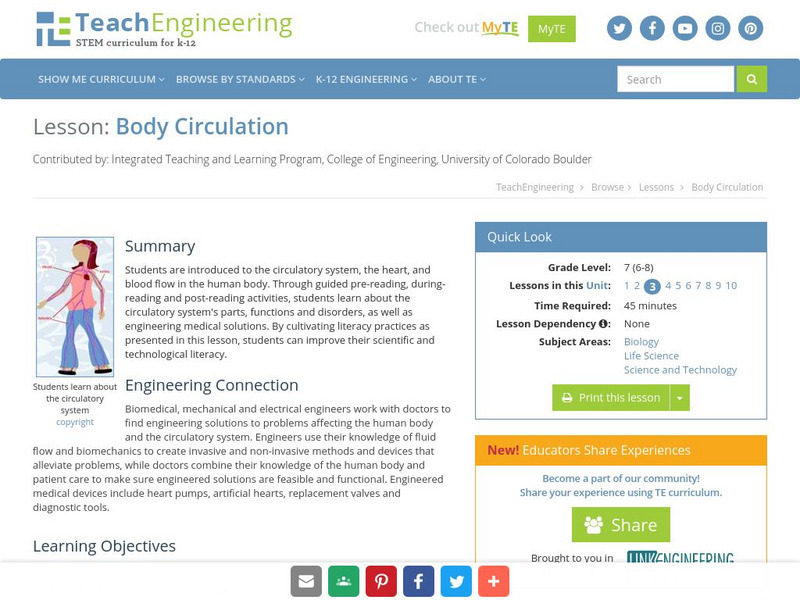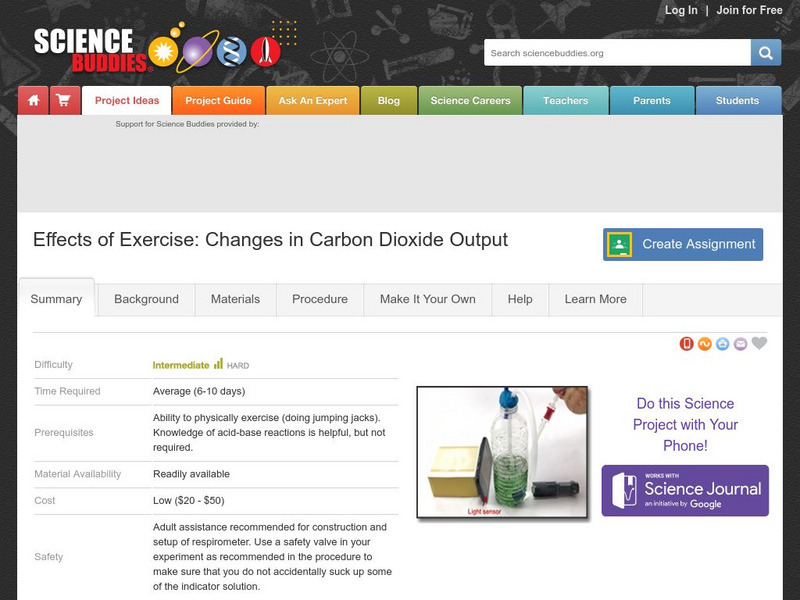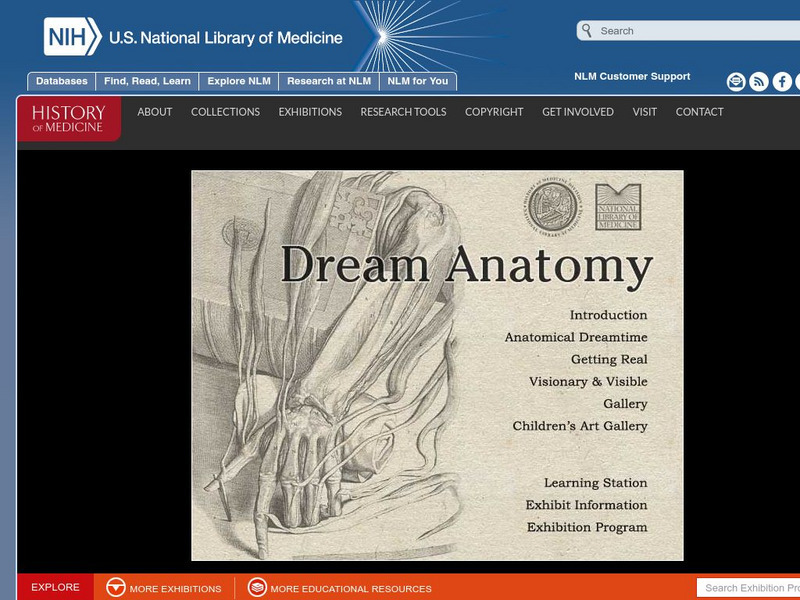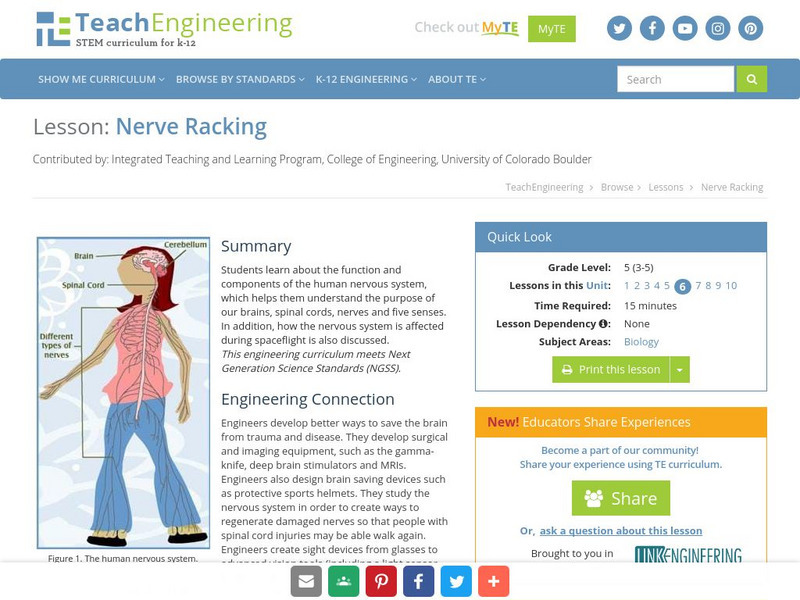Other
Get Body Smart: Respiratory System: Anatomy and Physiology
Students can learn about the human respiratory system's structures and functions through this easy-to-access tutorial. Sections include major zones and divisions, the nose and nasal cavity, the pharynx, the larynx, the trachea and...
Other
Nobel Prize in Physiology or Medicine Winners 2008 1901
A list of the Nobel Prize winners in Physiology or Medicine (updated yearly). Click on the names for more information.
OpenStax
Open Stax: Anatomy & Physiology: Barrier Defenses and Innate Immune Response
Students use this module to learn about the barrier defenses and the immune defense functions of the human body.
National Institutes of Health
National Library of Medicine: What's Happening to Your Body?
This lesson plan site focuses on the changes that adolescents go through and delves into their nutritional, physical, and mental health needs.
Georgia Department of Education
Ga Virtual Learning: Anatomy and Physiology: Endocrine System
Through informational text, video clips, practice problems, and external assignments, students discover the structure and function of the endocrine system of the human body.
TeachEngineering
Teach Engineering: Body Circulation
Students are introduced to the circulatory system, the heart, and blood flow in the human body. Through guided pre-reading, during-reading and post-reading activities, students learn about the circulatory system's parts, functions and...
Science Buddies
Science Buddies: Effects of Exercise: Changes in Carbon Dioxide Output
Everybody knows that your body needs oxygen to keep going, and that you breathe out carbon dioxide as waste. What happens when you exercise? You've probably noticed that you breathe faster, and your heart beats faster. What triggers your...
OpenStax
Open Stax: Anatomy & Physiology: Skeletal System Functions
This site helps you understand the human skeletal system, a body system composed of bones and cartilage that performs critical functions for the human body.
Other
Biology Online: Human Physiology: Sensory Systems
Study the many parts of the human body that make up the sensory systems. Be able to identify receptors, primary sensory coding, neural pathways and more with this biology resource.
OpenStax
Open Stax: Anatomy & Physiology: The Peripheral Nervous System
Describe the structures found in the peripheral nervous system and the functions of those parts in the human body.
National Institutes of Health
National Library of Medicine: Dream Anatomy
Take a step back in time to see the human body and the field of medicine through the looking glass of history. Experience a different kind of representation of our internal anatomy, and learn about the history of human dissection.
Other
Get Body Smart: Histology Links
Designed for students and teacher of anatomy and physiology, GetBodySmart offers free tutorials and quizzes from a wide-variety of resources, including the nation's top researchers and universities.
Texas A&M University
Human Physiology in Space
Learn about some of the environmental challenges facing humans in space.
OpenStax
Open Stax: Thoracic Cage
Learn here all about the thoracic cage, the part of the human anatomy that forms the thorax portion of the body.
Other
Washington University: Hemoglobin and the Heme Group:
This site from the Department of Chemistry at the Washington University provides a deetailed study of the role of hemoglobin in blood physiology. The article is somewhat in-depth, complete with pictures, charts, and a bibliography.
Other
Dr. Saul: Biology in Motion
This interactive site provides animations and activities in several areas of physiology. The images are simple, but clear. The accompanying text provides a good description of the process being shown.
Alabama Learning Exchange
Alex: New Town Health Club
Over the course of the year, the students in Human Anatomy and Physiology will design a health club. As part of this year-long project, the students will develop a brochure or print advertisement for the health club. This project will...
TeachEngineering
Teach Engineering: Polluted Air = Polluted Lungs
To gain a better understanding of the roles and functions of components of the human respiratory system and our need for clean air, students construct model lungs that include a diaphragm and chest cavity. They see how air moving in and...
University of Utah
University of Utah: Cardiovascular Pathology Index
This site features a detailed index of photographs for cardiovascular pathology. You can see what a normal human heart looks like and what a sick one looks like too. Come and check it out.
TeachEngineering
Teach Engineering: Digestion Simulation
To reinforce students' understanding of the human digestion process, the functions of several stomach and small intestine fluids are analyzed, and the concept of simulation is introduced through a short, introductory demonstration of how...
PBS
Pbs Learning Media: Amazing Heart Facts
This feature from the NOVA: "Cut to the Heart" highlights facts about the heart, including its size and placement, and will help you to understand the importance of this wondrous organ in our bodies.
Other
Marine Biological Laboratory: Why Study Marine Organisms for Biomedical Research
Descriptions of various research projects using marine organisms that have direct impact on medical research. The resource has a perspective on how medicine makes progress.
TeachEngineering
Teach Engineering: Nerve Racking
This instructional activity describes the function and components of the human nervous system. It helps students understand the purpose of our brain, spinal cord, nerves and the five senses. How the nervous system is affected during...
American Forum for Global Education
American Forum for Global Education: Parts of You
This site is provided for by the American Forum for Global Education. Exploration of body parts is the format used to teach the economic concept of interdependence to primary young scholars.



